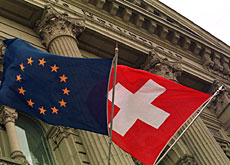
Thumbs up for EU bilateral ties

A year after Switzerland sealed closer ties with the European Union, the government says agreements governing trade, transport and labour have been a success.
The first set of bilateral accords – seen as an alternative to EU membership – came into force on June 1, 2002.
The economics minister, Joseph Deiss, says bilateral deals are currently the only politically acceptable way in Switzerland of forging closer ties with the EU. The Swiss made clear in a vote in 2001 that they were not willing to consider joining.
But Deiss warns that a refusal by Swiss voters to extend an agreement on the free movement of people to the ten new EU member states – due to join in 2004 – could have serious consequences for the Swiss economy.
“If there were a ‘no’ vote [in a referendum] it would probably be unacceptable to the EU,” he told swissinfo.
“We think the EU would probably abandon all the treaties, and those who are against extending the [free movement of people] agreement must realise how harmful such a decision would be for our economy.”
Promising start
Taking stock of the effect the first set of bilaterals have had on Swiss-EU relations, Deiss said that although it would be premature to draw any lasting conclusions, the first signs were promising.
“We are not able to give a final statement about the effects of these treaties,” he said.
“But what we can say is that there has been no evidence of huge changes in areas people thought would cause problems.”
Opponents of closer Swiss-EU ties had warned that the agreement covering the free movement of people would lead to a big increase in foreigners looking to live and work in Switzerland.
Deiss said this had clearly not been the case. He admitted that the annual quota of permanent residence permits granted by Switzerland – 15,000 – had been reached within ten months of the agreement coming into effect.
But he said the high number of cross-border commuters applying for permits – and especially those from Germany – had artificially boosted demand in the first year.
Moreover, only half of the temporary residence permits available – 115,500 annually – had been handed out, which was proof, according to Deiss, that fears of a wave of foreign labour swamping the country had been unfounded.
Road traffic
Similarly, worries that Switzerland’s roads would be flooded with heavy goods vehicles (HGV) transporting freight through the Swiss Alps had also proved groundless.
On the contrary, Deiss said figures showed that there had actually been a nine per cent drop in the number of trucks on Swiss motorways, while at the same time the volume of freight had increased by two per cent.
Deiss said this had been achieved by a clause in the transportation agreement that had increased the maximum weight allowance per truck from 34 to 40 tons.
Although haulage companies have complained about a hike in road tax for HGVs, they have welcomed the increase in business.
That increase also boosted government coffers by SFr882 million in 2002. Two thirds of the money will be used to finance improvements in Switzerland’s rail infrastructure.
New negotiations
Talks are currently underway on a second set of ten bilateral agreements between Switzerland and the EU.
These include Switzerland becoming a member of the Schengen-Dublin accords – the EU’s common policy on cross-border crime and asylum – taxation of savings, prevention of fraud and education and professional training.
Agreement on the additional ten policy areas would see Switzerland taking a significant step towards closer ties with the EU – without actually becoming a member.
Both sides hope that talks could be wrapped as early as the end of June. Deiss says one major stumbling block – the argument over taxation of savings of EU citizens with accounts in Switzerland – could be resolved at the next meeting of EU finance ministers in Luxembourg on June 3.
“From our point of view we must say that the agreement on taxations of savings is now ready and we hope that [on Tuesday] the EU will be able to give the green light,” he said.
“There are still one or two difficult questions that need to be resolved on the Schengen and tax fraud agreements, but we are quite close to a conclusion – which people didn’t expect at the beginning of this year,” he added.
swissinfo, Jonathan Summerton
The Swiss voted in favour of the first set of bilateral agreements by 67 per cent in May 2000.
The agreements governing labour, trade and transport came into force in June 2002.
Switzerland is negotiating a second round of ten bilateral accords including taxation of savings, prevention of fraud and education and professional training.

In compliance with the JTI standards
More: SWI swissinfo.ch certified by the Journalism Trust Initiative




























You can find an overview of ongoing debates with our journalists here . Please join us!
If you want to start a conversation about a topic raised in this article or want to report factual errors, email us at english@swissinfo.ch.